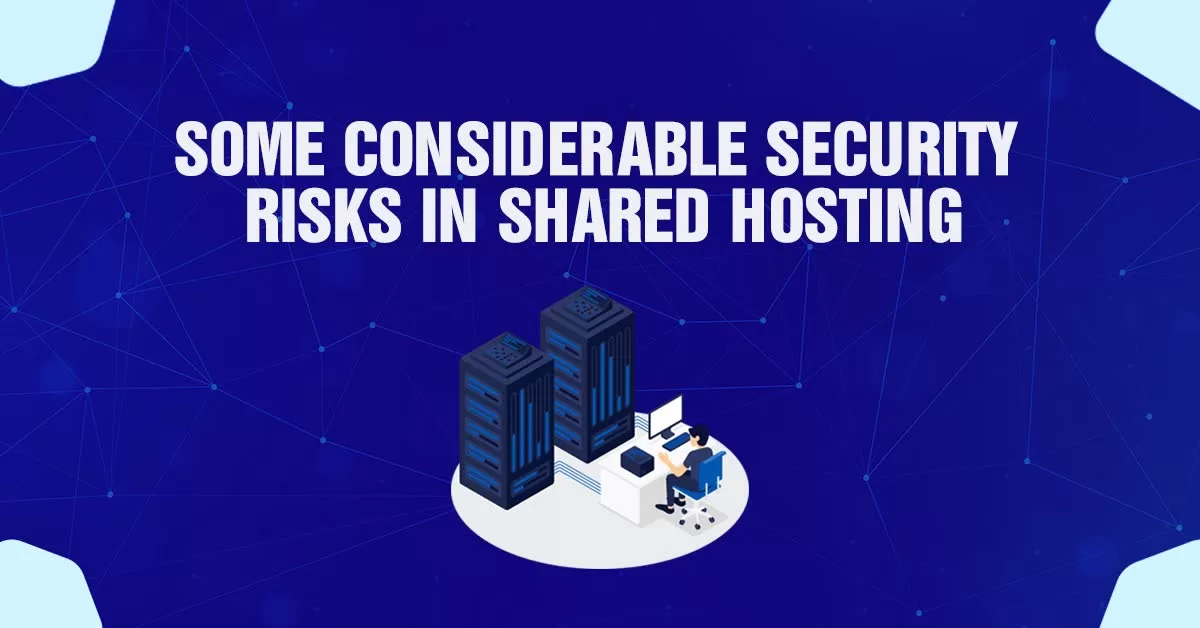Some Considerable Security Risks In Shared Hosting
Shared hosting is a type of hosting where several websites share a single server’s resources. Shared hosting is the most-used type of website hosting in the world since it is a cheap option to host a website without sacrificing its performance. Actually, the operation of shared hosting is fairly straightforward. RAM, storage and CPU cores on the server serve as a sizable resource pool. This resource pool is available to and used by all the websites on the server. Websites can split the cost of resources thanks to this infrastructure, which makes shared hosting very affordable.
Since this method is used to host hundreds of thousands of websites, a few security vulnerabilities have surfaced over time. This article identifies five significant dangers and offers a solution for each.
Shared Hosting – Overview
Shared hosting is a term used to describe a web hosting environment where many websites reside on one web server connected to the internet. Each site sits on its own partition, or section/slice, of the server. This allows for multiple companies or individuals to share the cost of a server, as well as the server’s resources like data storage, bandwidth, and RAM. Shared hosting is one of the most popular and economical choices for website hosting, especially for first-time site owners and small businesses.
Being the most popular type of web hosting service, shared hosting is typically used by small businesses and individuals who have websites with low to moderate traffic levels. A shared hosting service allows multiple websites to be hosted on a single server, with each website sharing the server’s resources (such as CPU, RAM, and disk space). Shared hosting is a cost-effective solution for small businesses and individuals with modest website needs.
Many web hosting service companies offer multiple tiers of service, with the main difference being the number of resources (disk space, CPU, bandwidth, email accounts, etc.) that are allocated to each customer. Shared hosting is the most basic type of web hosting service where resources are shared between multiple customers.
Security Risks Of Shared Hosting
1. Unaware Of Who The Neighbours Of Your Server Are
Due to the strict privacy regulations that web hosting firms must follow, they are unable to share their client list. As a result, you are unaware of who (or what kinds of websites) you are sharing the server with.
When you consider spam sites and websites operated unlawfully are constantly prohibited, this becomes an issue. Search engines, however, are unable to blacklist a particular website. Instead, they shut down the entire server, which naturally shuts down your website as well. Despite the fact that you haven’t done anything wrong, your website could get entirely restricted and pulled down. This is a major risk.
Solution
The problem can be solved by selecting a web hosting businesses that are reputable, have a track record of providing dependable shared hosting services and abide by the fair usage of policies. The top players in the market will not provide services to known offenders since their reputation is at risk. In addition, a plethora of steps is in place to deplatform spam websites.
The likelihood of your website getting shut down will be much reduced if you stick with reputable web hosting providers. Always check reviews on unbiased websites before choosing a shared hosting package. You will get all the information you require.
2. Increased Occurrence Of DDoS attacks
The term ‘DDoS’ refers to a sort of cyber assault when a server is overloaded with requests from several devices to a point that it can no longer handle the demands and crashes or, worse still, entirely shuts down.
With shared hosting, this is a particularly serious problem because your website may be impacted even if it isn’t experiencing a DDoS attack. Such an assault impacts the entire server and not just one particular website. Your website will fall down as well because it won’t have any resources if your server is too busy responding to requests for a single website that is being attacked.
Solution
Sadly, there is no one-stop solution to this issue. Everyone who uses the server, as well as the server owner, is responsible for preventing DDoS attacks. Your web hosting firm is in charge of making sure that there are firewalls and tools for detecting and preventing malware.
By adhering to the greatest cyber security guidelines, users like you can contribute the most to the solution. This entails performing routine application updates, implementing two-factor authentication for your website, and utilising strong passwords and other security measures.
3. Website Could Be Compromised If Another Is Attacked
The websites on a server share the same pool of resources in a shared hosting environment, as was previously established. It’s not too difficult for a hacker to look at other websites once they have access to one of these websites. A compromised website puts all the other websites that are on the server in danger because all share the same IP address and comparable general infrastructure.
Solution
Use antivirus software and malware protection as a solution. There will be a list of programmes that are natively supported by your web host. These programmes will add an extra layer of protection to your website.
Configure your file permission settings as well. The goal here is to modify your cPanel dashboard’s settings so that only you have access to your files. Online, there are a ton of simple instructions that can be followed, and the procedure itself is simple. Spending a few minutes on this will undoubtedly benefit you in the long run.
4. Attacks On Your Website
We’ve looked at the numerous ways your website might be vulnerable to attacks on other websites. However, just like any other hosting service, your website may also be intentionally targeted for assault.
Financial data, consumer information and business paperwork are all accessible. However, your antivirus and malware scanners ought to stop that from happening. These programmes sometimes can’t stop hackers from accessing your server to run their own files, redirect users to spam websites and do other malicious activities.
Solution
The majority of these malicious scripts are executed using the computer language PHP. There is a simple solution to stop this, though. Disable PHP execution in untrusted directories by default. By doing this, an attack will be effectively stopped even if the hackers create new folders and files because those will be regarded as untrustworthy and won’t run any PHP code.
5. Delayed Loading
Although it might not appear like a direct security issue, a cyber attack is one of the reasons why your website might become slower. No matter what kind of assault it is or which specific website is the target, shared hosting frequently experiences a performance hit, so severe, that your website may just stop functioning.
Solution
If the issue has gotten worse over time, your website is certainly expanding and requires more resources. However, if the issue appears suddenly and lasts only briefly, it might be an attack.
The easiest approach to avoid this is to take a variety of precautions, such as using an antivirus and malware detection tool, adhering to all cyber security practices, purchasing your shared hosting package from a reputable web hosting provider and so on.
Conclusion
Security cannot be confirmed with just one programme or technology, it requires a comprehensive approach. Because your hosting firm effectively owns the server when you choose a shared hosting plan, it’s critical that you pick a reputable web host that can provide security in addition to dependability and speed. If these principles are solid, you can start building your business instead of worrying about your website.






































